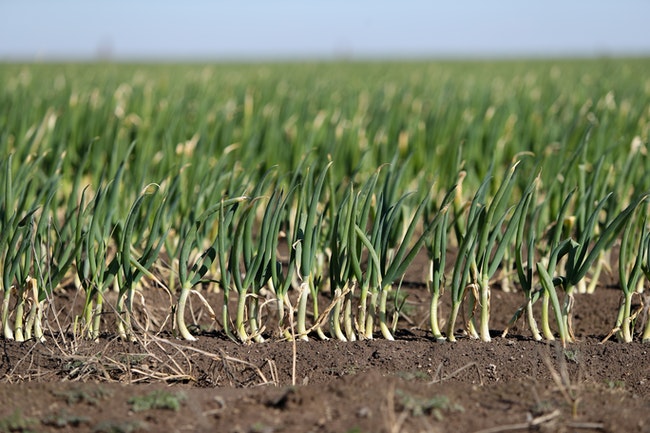
An onion field off of 76th Avenue Northeast on Friday, March 12, 2021. (Amanda Loman/Salem Reporter)
Javier Ceja has worked in Oregon’s fields for 40 years, often putting in 11 or 12-hour days to harvest fruits and vegetables.
Now, he’s joining fellow Oregon farmworker Anita Santiago and Salem nonprofit Mano a Mano Family Center in a legal challenge to state rules which exclude agricultural workers from getting overtime pay.
The Oregon Law Center filed the petition on their behalf with the Oregon Court of Appeals Tuesday challenging current state Bureau of Labor and Industries rules about overtime for Oregon workers.
BOLI rules require most Oregon employers to pay employees overtime when they work more than 40 hours per week. But the rules exempt most agricultural employees.
Oregon used to have a state law explicitly blocking agricultural workers from overtime, but the Legislature repealed that law in 2017.
As a result, the petition says there’s no legal reason BOLI can’t include farmworkers in its overtime rules. It also contends BOLI failed to consider whether overtime pay is necessary to the health and wellbeing of agricultural workers when it adopted the rules.
“During the last couple of years we’ve seen agricultural workers out there during the pandemic, while Oregon was burning,” said Levi Herrera-Lopez, executive director of Mano a Mano. “Still they don’t qualify for overtime. For us it’s not fair and it’s something that should have been done a while ago.”
Oregon has about 86,000 agricultural workers, with more than 13,000 in Marion County, according to a 2018 state report. The vast majority are Hispanic.
The nonprofit was formed in the 1980s to assist farmworkers through food banks and public health outreach. Agricultural workers still make up about half their clients.
Herrera-Lopez said the families they serve are very low-income, and the lack of overtime pay is a contributing factor.
“We’ve been hearing very loudly over the past couple years that agricultural workers are essential to Oregon and we know we all benefit from their labor,” he said. “Every cent matters, and every cent that can go into the pocket of an agricultural worker has the potential of helping them lift out of poverty and it goes back into our community too.”
The petition describes the stress and health problems Ceja and other farmworkers experience due to long hours and a lack of financial security. Though he’s now in his 70s and of retirement age, Ceja continues to work in agriculture and suffers from high blood pressure and stomach problems because of work-related stress, the petition said.
“He sees many co-workers experience similar stress and health issues, including mothers and fathers who both must work long hours to survive but get no rest because they must care for children when they arrive home late at night, often after having waked early to begin work,” the petition said.
In response, Val Hoyle, Oregon’s labor commissioner, said in a statement her agency was only recently notified they have the ability to set overtime rules for agricultural workers.
“Since then, we have worked in good faith with stakeholders including workers, farmers and growers to enact changes to those overtime rules that respect and take care of Oregon’s workforce,” she said.
“Unfortunately, this lawsuit will halt that work and will delay our ability to get farmworkers their overtime wages. The legal filing makes it so that we are precluded from communication with stakeholders and now all communications must be handled through the Department of Justice.”
The filing comes following an unsuccessful effort by farmworker advocacy groups to pass a bill during the 2021 legislative session requiring overtime pay for agricultural employees.
In a statement Wednesday, a coalition of Oregon agricultural employer groups said the petition would undermine work being done in a legislative workgroup that’s discussing agricultural overtime.
“The impacts of this proposal are complex due to the nature of Oregon’s agricultural economy, the needs of employees, and the seasonal nature of agricultural work. These considerations are presently being discussed by legislators and the workgroup, and this lawsuit undermines those good faith discussions,” said the statement, which was signed by 10 agricultural organizations including the Oregon Farm Bureau Federation, Oregon Association of Nurseries and Oregon Winegrowers Association.
The statement said the pandemic has adversely affected Oregon farms.
“We care deeply about the health and welfare of our employees and pay among the highest wages for agricultural production in the world. However, our farms compete in a global marketplace and are price takers, meaning that they are unable to pass along any price increases in their operations to consumers. These factors make agricultural overtime discussions complex, as well-intentioned policies could have significant impacts on farm viability and availability of agricultural work,” the statement said.
Neighboring states have recently adopted overtime laws for agricultural employees. A California bill passed in 2016 began phasing in farmworker overtime in 2019 for larger agricultural employers, with smaller employers affected beginning in 2022.
A new Washington law will phase in overtime for agricultural workers starting in 2022.
Rep. Andrea Salinas, D-Lake Oswego intends to reintroduce a farmworker overtime bill during the 2022 short session, The Oregonian/OregonLive reported.
Contact reporter Rachel Alexander: [email protected] or 503-575-1241.
JUST THE FACTS, FOR SALEM – We report on your community with care and depth, fairness and accuracy. Get local news that matters to you. Subscribe to Salem Reporter starting at $5 a month. Click I want to subscribe!









